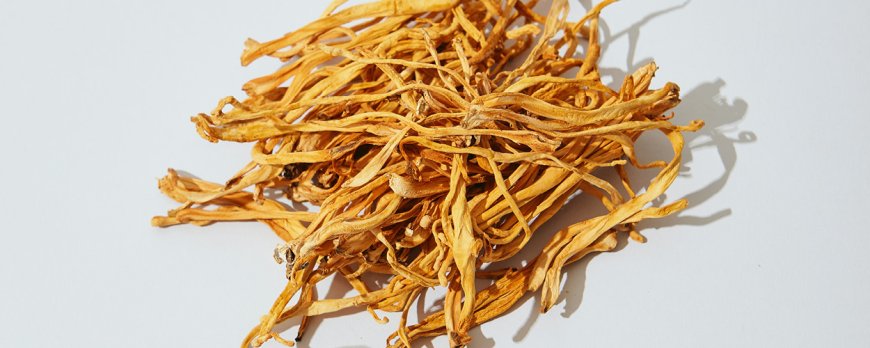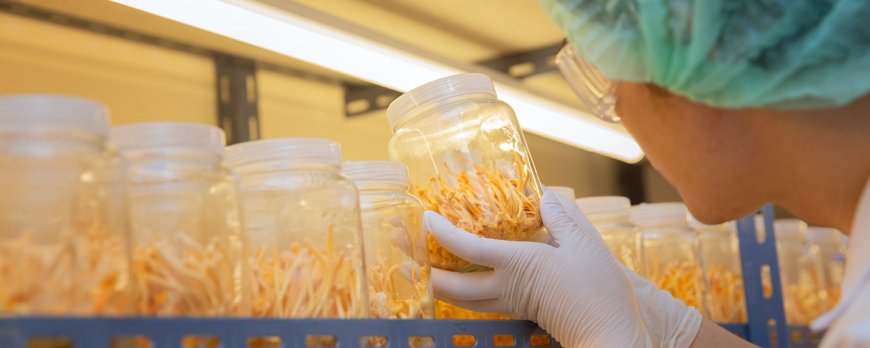How do cordyceps modulate the immune response?
Discover 'How do cordyceps modulate the immune response?' in this enlightening exploration of cordyceps and their surprising role in immunity.

How do cordyceps modulate the immune response?
Cordyceps, a fungus used in traditional medicine, has been found to have immunomodulatory effects that can positively impact the immune response. Different extracts of Cordyceps militaris, such as total extracts, polysaccharides, and cordycepin, have been shown to promote different types of immune responses. The balance between type 1 and type 2 immunity is crucial for overall health, and cordyceps extracts have been found to modulate the immune system in various ways.
Key Takeaways:
- Cordyceps modulate the immune response by influencing the activity of immune cells and the secretion of cytokines.
- Total extracts obtained using water or 50% ethyl alcohol promote type 1 immunity, while extracts obtained using 70-80% ethyl alcohol and cordycepin are more likely to promote type 2 immunity.
- Cordyceps extracts have been shown to reduce inflammation, modulate macrophage activity, and increase the secretion of interferon-gamma by macrophages.
- Cordyceps may have potential therapeutic effects on asthma and can induce phagocytic activity in macrophages.
- The immunomodulatory effects of cordyceps highlight its potential as a natural and holistic approach to boosting immune system function.
The Different Types of Immune Responses
The immune system can elicit different types of responses, known as type 1 and type 2 immunity, which play a crucial role in maintaining optimal immune system function. These two types of immune responses have distinct characteristics and functions, each contributing to the body's defense against pathogens and the maintenance of overall health.
Type 1 immunity: This type of immune response is characterized by the activation of T-helper 1 cells and the production of pro-inflammatory cytokines, such as interferon-gamma. Type 1 immunity is typically associated with the body's defense against intracellular pathogens, including viruses and certain bacteria. It promotes the elimination of infected cells and enhances the activity of natural killer cells and cytotoxic T lymphocytes.
Type 2 immunity: In contrast, type 2 immunity involves the activation of T-helper 2 cells and the production of anti-inflammatory cytokines, such as interleukins 4, 5, and 13. This immune response is primarily directed against extracellular pathogens, such as parasites and allergens. Type 2 immunity is involved in tissue repair, antibody production, and the recruitment of eosinophils and mast cells.
The balance between type 1 and type 2 immunity is essential for maintaining a healthy immune system. Disruption of this balance can lead to immune dysregulation and the development of various diseases. As studies have shown, Cordyceps militaris extracts, including total extracts, polysaccharides, and cordycepin, have the ability to modulate these immune responses by promoting either type 1 or type 2 immunity, depending on the specific extract used. This makes cordyceps a potential candidate for supporting immune system function and overall health.
Cordyceps Extracts and Immune Responses
Various cordyceps extracts have been found to modulate immune responses, potentially contributing to improved immune health and regulation. Cordyceps militaris, a medicinal fungus used in traditional medicine, has shown immunomodulatory effects that can influence the activity of immune cells and the secretion of cytokines.
Studies have revealed that different extracts of Cordyceps militaris, including total extracts, polysaccharides, and cordycepin, have the ability to promote different types of immune responses. Extracts obtained using water or 50% ethyl alcohol tend to promote type 1 immunity, while extracts obtained using 70-80% ethyl alcohol and cordycepin are more likely to promote type 2 immunity. This balance between type 1 and type 2 immunity is crucial for maintaining overall health.
In addition to their immunomodulatory effects, cordyceps extracts have shown other potential benefits for the immune system. They have been found to reduce inflammation, modulate macrophage activity, and increase the secretion of interferon-gamma by macrophages. Interferon-gamma is an essential cytokine involved in immune regulation. Cordyceps extracts have also demonstrated potential therapeutic effects on asthma, a chronic inflammatory respiratory condition, and have been shown to induce phagocytic activity in macrophages, an important process for eliminating pathogens and enhancing immune responses.
In conclusion, cordyceps extracts have the potential to modulate immune responses and contribute to improved immune health and regulation. They can influence the activity of immune cells, secretion of cytokines, and have shown promising effects on inflammation reduction, macrophage activity, interferon-gamma secretion, asthma therapeutic effects, and phagocytic activity. Further research is needed to fully understand the mechanisms and therapeutic potential of cordyceps in immune modulation.

Immunomodulatory Effects of Cordycepin
Cordycepin, a compound present in cordyceps, exhibits immunomodulatory effects and possesses antiviral properties, suggesting its potential for immune system boosting. Studies have shown that cordycepin can influence the immune response in several ways, making it an intriguing component for enhancing immune health.
Here are some key points regarding the immunomodulatory effects of cordycepin:
- Cordycepin has been found to promote type 1 immunity when obtained through total extracts obtained using water or 50% ethyl alcohol. Type 1 immunity is important for defending against intracellular pathogens and maintaining immune homeostasis.
- Total extracts obtained using 70-80% ethyl alcohol and cordycepin have been shown to promote type 2 immunity. This type of immune response is essential for defending against extracellular pathogens and maintaining immune balance.
- Cordycepin has been found to possess antiviral properties, which can help enhance the immune system's ability to fight off viral infections.
- Studies have also suggested that cordycepin may help reduce inflammation, which is a key factor in many chronic diseases and immune dysregulation.
Conclusion
The immunomodulatory effects of cordycepin make it an exciting area of research in the field of immune health. Further studies are needed to fully understand the mechanisms through which cordycepin influences the immune response and its potential therapeutic applications. Nevertheless, the current evidence suggests that cordycepin holds promise as a natural compound for immune system boosting and overall health.
Cordyceps and Inflammation Reduction
Cordyceps has been shown to play a role in reducing inflammation, thereby supporting optimal immune system function. Inflammation is a natural response of the immune system to injury or infection, but chronic inflammation can have negative effects on overall health. Studies have found that cordyceps extracts, such as total extracts obtained using water or 50% ethyl alcohol, have the ability to reduce excessive inflammation in the body.
By modulating the immune response, cordyceps extracts can help regulate the activity of immune cells, such as macrophages, which are responsible for initiating and coordinating the immune response. These extracts have been found to enhance macrophage activity, leading to improved immune system function. Additionally, cordyceps extracts have been shown to increase the secretion of interferon-gamma, a cytokine that plays a crucial role in immune regulation.
A balanced immune response is essential for maintaining overall health, and excessive inflammation can disrupt this balance. Cordyceps extracts have been found to have anti-inflammatory properties, making them a potential natural remedy for conditions associated with chronic inflammation, such as asthma. Research suggests that cordyceps may have therapeutic effects on asthma by reducing inflammation in the airways and supporting immune system function.
In summary, cordyceps modulate the immune response by reducing inflammation, enhancing macrophage activity, and promoting the secretion of interferon-gamma. These immunomodulatory effects make cordyceps a promising natural remedy for supporting optimal immune system function and maintaining overall health.

Cordyceps and Macrophage Activity
Cordyceps has been found to modulate macrophage activity, a crucial aspect of the immune response, thereby contributing to improved immune system function. Macrophages are a type of white blood cell that play a key role in the immune system by engulfing and digesting pathogens, foreign substances, and cellular debris. They are responsible for initiating and coordinating an immune response against infections and diseases.
Research has shown that cordyceps extracts can enhance macrophage function and activity. These extracts have been found to stimulate phagocytosis, the process by which macrophages engulf and destroy foreign substances. By enhancing phagocytic activity, cordyceps can help bolster the immune response, enabling the body to better defend against pathogens and maintaining overall immune health.
In addition to promoting phagocytic activity, cordyceps extracts have also been found to regulate the secretion of cytokines by macrophages. Cytokines are signaling molecules that play a crucial role in immune system regulation. By influencing the secretion of cytokines, cordyceps can modulate the immune response and help maintain a balanced immune system function.
Benefits of Cordyceps on Macrophage Activity:
- Enhanced phagocytic activity to eliminate pathogens
- Stimulated immune response against infections and diseases
- Regulated secretion of cytokines for balanced immune system function
The ability of cordyceps to modulate macrophage activity highlights its potential as an immunomodulatory agent. By influencing the activity of immune cells and the secretion of cytokines, cordyceps can promote a balanced immune response and contribute to overall immune system function.
Interferon-Gamma Secretion and Cordyceps
Cordyceps has been shown to stimulate the secretion of interferon-gamma, a key cytokine involved in immune regulation, suggesting its potential for immune response modulation. Interferon-gamma plays a crucial role in orchestrating immune responses, including the activation of immune cells and the regulation of inflammation. By promoting the secretion of this important cytokine, cordyceps may enhance the body's ability to mount an effective immune response.
In addition to stimulating interferon-gamma secretion, cordyceps has been found to have other immunomodulatory effects. Research has shown that cordyceps extracts, such as total extracts obtained using water or 50% ethyl alcohol, tend to promote type 1 immunity. This immune response is characterized by the activation of cells involved in fighting off pathogens, such as T cells and natural killer cells. Total extracts obtained using 70-80% ethyl alcohol and cordycepin, a compound found in cordyceps, have been found to promote type 2 immunity. This immune response is associated with the production of antibodies and the regulation of allergic and autoimmune reactions.
Furthermore, cordyceps extracts have been shown to possess anti-inflammatory properties. They can reduce excessive inflammation, which is often associated with chronic diseases and immune dysregulation. Cordyceps has also been found to modulate macrophage activity, a type of immune cell involved in the detection and destruction of pathogens. By influencing macrophage function, cordyceps may enhance the immune response and improve overall immune system function.
Cordyceps Immune Modulation: Key Points
- Cordyceps stimulates the secretion of interferon-gamma, a cytokine involved in immune regulation.
- It promotes both type 1 and type 2 immune responses, which are essential for balanced immune function.
- Cordyceps exhibits anti-inflammatory properties and modulates macrophage activity.
These effects suggest that cordyceps has the potential to modulate the immune response and contribute to overall immune health. More research is needed to fully understand the mechanisms and therapeutic implications of cordyceps in immune regulation.

Cordyceps and Asthma Therapeutic Effects
Cordyceps shows promise as a potential therapeutic agent for asthma, providing immune health benefits and potentially reducing asthma-related inflammation. Studies have suggested that cordyceps extracts, including total extracts and cordycepin, can have beneficial effects on respiratory health, making them a possible natural remedy for asthma management.
Research has shown that cordyceps extracts have immunomodulatory properties, which can help regulate the immune response in individuals with asthma. By modulating immune system function, cordyceps may assist in alleviating inflammation in the airways and reducing asthma symptoms.
Moreover, cordyceps extracts have been found to possess bronchodilatory effects, which can help open up the airways and improve breathing in individuals with asthma. This natural remedy may promote better lung function and provide respiratory support for those living with this chronic inflammatory condition.
Benefits of Cordyceps for Asthma:
- Immunomodulatory effects to regulate the immune response
- Potential reduction of inflammation in the airways
- Bronchodilatory properties to improve lung function
- Possible respiratory support for asthma management
While more research is needed to fully understand the mechanisms behind cordyceps' effects on asthma, these initial findings suggest that cordyceps may hold promise as a natural therapeutic option for individuals with this respiratory condition. However, it is important to consult with a healthcare professional before incorporating cordyceps or any other natural supplements into your asthma management plan.

Cordyceps and Phagocytic Activity
Cordyceps has been found to stimulate phagocytic activity in macrophages, suggesting its potential role in enhancing immune response regulation. Phagocytosis is a crucial process by which macrophages engulf and eliminate pathogens, thereby strengthening the immune system's ability to defend against infections.
Studies have shown that the extracts of Cordyceps militaris can significantly increase the phagocytic activity of macrophages. This enhanced activity allows macrophages to efficiently engulf and destroy harmful microorganisms, contributing to a more robust immune response. By promoting phagocytic activity, cordyceps extract may help to strengthen the body's defense against infections.
In addition to promoting phagocytic activity, Cordyceps extract has also been found to modulate immune responses through the secretion of cytokines. Cytokines are signaling molecules that play a crucial role in immune regulation and coordination. By influencing cytokine production, cordyceps extract may help to achieve a balance between different immune responses, contributing to overall immune system health.
Furthermore, the immunomodulatory effects of cordyceps can promote immune response regulation. Through its ability to stimulate phagocytic activity and modulate cytokine secretion, cordyceps extract may help to regulate immune cell function and promote a balanced immune response. This balance is essential for maintaining optimal immune system function and overall health.
The Influence of Cordyceps on Immune Cells and Cytokines
Cordyceps has been shown to impact immune cells and the secretion of cytokines, playing a role in modulating the overall immune response. The immunomodulatory effects of Cordyceps militaris, a fungus used in traditional medicine, have been extensively studied. Various extracts of Cordyceps militaris, including total extracts, polysaccharides, and cordycepin, have been found to promote different types of immune responses.
- Total extracts obtained using water or 50% ethyl alcohol tend to promote type 1 immunity. Type 1 immunity is characterized by a pro-inflammatory response and is crucial for combating infections and foreign pathogens.
- Total extracts obtained using 70-80% ethyl alcohol, as well as cordycepin, are more likely to promote type 2 immunity. Type 2 immunity is associated with anti-inflammatory and tissue repair responses, and it plays a role in maintaining immune balance.
The balance between type 1 and type 2 immunity is important for overall health, as an imbalance can lead to chronic inflammation or immune dysfunction. Cordyceps extracts have been found to possess various immunomodulatory properties that contribute to immune system regulation.
Impact on Immune Cells
Cordyceps extracts have been shown to modulate the activity of immune cells, such as macrophages. Macrophages play a critical role in the immune response by eliminating pathogens and regulating inflammation. Research indicates that cordyceps can enhance macrophage activity, leading to improved immune system function and protection against infections.
Role in Cytokine Secretion
Cytokines are small proteins that act as messengers between immune cells, promoting communication and coordination within the immune system. Cordyceps extracts have been found to influence the secretion of cytokines, particularly interferon-gamma secreted by macrophages. Interferon-gamma plays a vital role in immune regulation and is involved in antiviral defense, tumor suppression, and immune system modulation.
Overall, the influence of cordyceps on immune cells and cytokines highlights its potential as an immunomodulatory agent. By promoting balanced immune responses and regulating immune cell activity, cordyceps may contribute to maintaining optimal immune system function and overall health.

The Importance of Cordyceps in Immune Modulation
Cordyceps plays a significant role in immune modulation, influencing immune response and contributing to improved immune system function. This powerful fungus, known for its medicinal properties, has been found to have immunomodulatory effects that can have a positive impact on overall health.
One key aspect of cordyceps' immune-modulating properties is its ability to promote a balanced immune response. Different extracts of Cordyceps militaris, such as total extracts, polysaccharides, and cordycepin, have been shown to promote various types of immune responses. Depending on the extraction method, cordyceps extracts can promote either type 1 immunity or type 2 immunity. The balance between these two types of immune responses is crucial for maintaining optimal immune system function.
Studies have also revealed that cordyceps extracts possess anti-inflammatory properties, reducing excessive inflammation in the body. In addition, cordyceps has been shown to modulate macrophage activity, enhancing their ability to eliminate pathogens and support immune system function. Furthermore, cordyceps extracts have been found to increase the secretion of interferon-gamma, an essential cytokine involved in immune regulation.
Importantly, cordyceps has shown potential therapeutic effects for asthma, a chronic inflammatory respiratory condition. By improving immune health and reducing inflammation, cordyceps may help alleviate symptoms associated with asthma.
The influence of cordyceps on immune cells and cytokines further highlights its importance in immune modulation. By influencing the activity of immune cells and the secretion of cytokines, cordyceps can help regulate the immune response and enhance its overall function.
In conclusion, cordyceps' ability to modulate the immune response is significant. Its effects on immune cells, cytokines, and different types of immune responses highlight its potential as a natural immunomodulatory agent. By incorporating cordyceps into our health regimen, we can potentially support a balanced immune system and promote overall well-being.
Conclusion
In conclusion, cordyceps exhibits immunomodulatory properties that can positively impact the immune response and contribute to enhanced immune health. The research on Cordyceps militaris has demonstrated its ability to promote different types of immune responses, depending on the type of extract used. Total extracts obtained with water or 50% ethyl alcohol tend to promote type 1 immunity, while extracts obtained with 70-80% ethyl alcohol and cordycepin are more likely to promote type 2 immunity.
The balance between these immune responses is crucial for overall health, as an imbalance can lead to various health issues. Cordyceps extracts have also shown anti-inflammatory effects, reducing excessive inflammation that can contribute to chronic diseases. Moreover, cordyceps has been found to modulate macrophage activity, enhancing their ability to fight off pathogens and support immune function.
Furthermore, cordyceps has been shown to increase the secretion of interferon-gamma by macrophages. Interferon-gamma is an essential cytokine involved in immune regulation, further highlighting the immunomodulatory effects of cordyceps. Studies have also indicated potential therapeutic effects of cordyceps on asthma, a chronic inflammatory respiratory condition, as well as its ability to induce phagocytic activity in macrophages, enhancing their ability to eliminate pathogens and strengthen the immune response.
Overall, the findings suggest that cordyceps can modulate the immune response by influencing the activity of immune cells and the secretion of cytokines. These immunomodulatory properties make cordyceps a promising natural compound for supporting immune health and potentially alleviating certain immune-related conditions. Further research is warranted to fully understand the mechanisms behind cordyceps' effects on the immune system and to explore its potential therapeutic applications.


































































































































